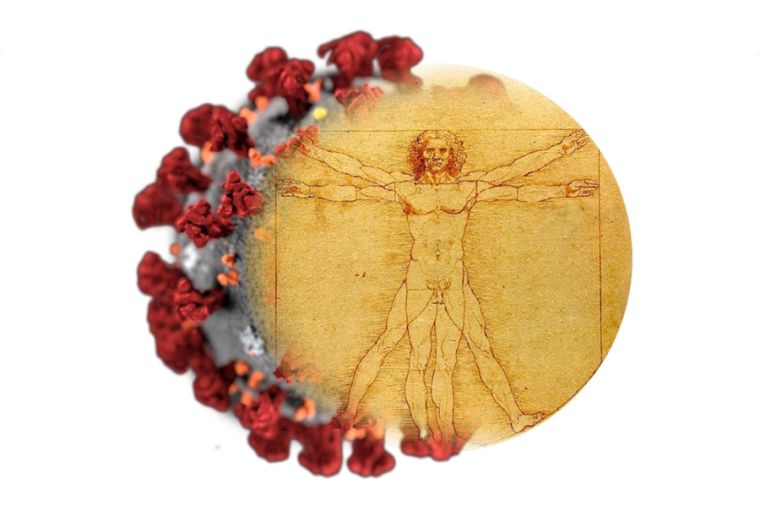The answer is YES to "this morality without moralism," based on true knowledge at a given moment and on a few principles that might bring order to our minds. It helps all of us, caring and cared for of this present day and the next, to become full-fledged actors in our participative democracy.
A viral epidemic requires both preventive and precautionary provisions. The distinction between the two is essential. Prevention addresses a proven risk. Its approach is rational and depends on the state of knowledge and the resulting expertise of the knowledgeable scientists and physicians involved. This is precisely what occurs with vaccination and even some curative treatments whose effects on contagiousness are proven. Precaution anticipates a supposed risk in an inherently irrational approach, which only falls under the responsibility of the political decision-maker, surrounded by experts in the field. These can include screening policies as well as systematized confinement, but also prior action plans for a severe epidemic.
So on which ethical principles can prevention and precaution rely?
The first of these is the primacy of the human being. This principle, enshrined in our French Civil Code, prevails at all stages of the epidemic pursuant to the words of Article 2 of the Council of Europe's Convention on Human Rights and Biomedicine (Oviedo Convention), the only binding legal instrument for the countries that have ratified it (France 2011): " The interests and welfare of the human being shall prevail over the sole interest of society or science." Respect for the human being and his dignity is inalienable, regardless of the level and stage of his care.
Three other principles are essential:
- the principle of non-maleficence (“do no harm”) particularly related to the transmission of the viral agent (human-to-human, animal-to-human and other endangerments of others)
- the principle of solidarity in the context of health crisis
- the principle of justice, such as equitable access to health care that is particularly tight in the event of overflowing health resources. It takes into account health needs and available resources (Oviedo Convention, art.3).
The announcement of a viral epidemic, let alone a pandemic, has to be prepared, stating the available resources, the data acquired on the new virus and its pathogenic power, and the continuous observation of epidemiological data (global in the event of a pandemic).
The mutagenic power of the virus impacts the unpredictability of its aggressiveness and contagiousness. It is never the same from one epidemic to another and can also vary within the same pandemic. This is why it is so difficult for a state to be prepared for the next epidemic on the grounds of the precaution principle and to anticipate its economic impact. All it can do at the most, is organize the sanitary, industrial, economic and social mobilization in anticipation of an epidemic "state of war", on the basis of the 4 principles mentioned above. As the virus has no borders, a European-wide health and economic organization can only strengthen the fight against the pandemic.
The essentials
A virus is neither a bacterium, nor a parasite or a fungus. It might be the most devious and contagious of all infectious agents.
Its mode of action is particular: it introduces its genome into the cell it infects; the infected cell to defend itself memorizes it and can eliminate it (CRISPR-Cas9). The more viruses in an organism (viral load), the more it involves the defenses of the infected organism, sometimes excessively.
This explains why viral load increases all the more as contact with the virus is repeated, hence the interest of the sanitary confinement of infected or likely persons and the generalization of the wearing of masks until the specific tests allowing its detection are available.
This also explains why symptoms appear out of step with other non-viral infections, that they may go unnoticed, that they depend on the defenses of the infected organism sometimes diminished by an associated pathology (co-morbidity), by an advanced physiological age, by an inappropriate treatment replacing the body's natural defenses (aspirin, ibuprofen, corticosteroids...).
The virus also has the possibility of modifying its genome (mutagen power). This change can make it harmless as well as more aggressive. This mutagenic power also explains why the means of identifying the virus and measuring the viral load must adapt from one epidemic to another, sometimes within the same epidemic. The same is true for vaccines: flu virus leads to a year-over-year vaccine changes.
- Sanitary confinement (lockdown)
A priori, it consists of isolating infected people from others to treat them and prevent them from contaminating their loved ones. This convergence of interests of the individual and society is associated with that of science in charge of identifying the contamination of the virus concerned (direct and indirect tests).
If screening is not possible (no tests or unavailable tests) and due to a particular viral danger, confinement may extend to the entire population exposed to the epidemic, outside the basic requirements (health, food, hygiene, civil and military protection, financial resources). Wearing a mask is also an effective confinement tool as regards to the virus and healthy carriers.
Sanitary confinement may be part of other confinements exacerbating public health problems: in social medical facilities such as nursing homes, in overcrowded prisons, in other locked-in situations (cruise ships, air transport, business or tourist travel)
- Virus- related tests
It is important to distinguish:
- direct tests identifying Covid-19 genome in infected cells on nasopharyngeal, salivary, bronchial samples.
- Indirect testing for Covid-19 antibodies in the blood of people who may have been in contact with the virus and immunized
Viral load measurement can only be carried out in the event of a positive direct test. It reveals the presence of the virus for any contaminated subject, whether symptomatic or asymptomatic, especially in the early stages of disease and much less in advanced severe forms with respiratory failure.
Serological research of anti-COVID-19 antibodies is of interest later, especially when the virus is no longer detectable. The duration of natural immunity is unpredictable, variable depending on the individual.
- Treatments
Here we have to distinguish between treatments that work:
- on clinical symptoms: from fever (paracetamol) to respiratory distress (respiratory assistance)
- against the virus and reducing viral load, or on the immune (inflammatory) response especially in case of hyper-response (immune storm affecting the youngest)
- strengthening specific immunity against the virus: vaccines whose manufacturing times are delayed compared to the pandemic and subjected to the mutagenic hazards of the virus.
Any self-medication is prohibited, any treatment is to be prescribed by a medical doctor who will assess the risks and avoid inappropriate drug combinations. He is the only responsible. The treating physician is the first referral at the first supposed signs of virosis. He is at the start of the health chain in charge of the epidemic: specialist, emergency, infectious disease, Intensive care physicians. Any weak link is a weapon offered to the virus.
Research for new treatments that affect the virus and natural immunity is essential.
- The end of the epidemic
The end of lockdown strategy is complex, multiparametric in order to avoid an epidemic rebound.
It is a matter of social, economic and of course health considerations.
It can use viral immunity screening, extended containment of unimmunized and vulnerable people, and large epidemiologic and geographic data.
Lockdown end can only be progressive, organized and supportive.
The State of War Against COVID-19
COVID-19 is an aggressive and highly contagious virus (pandemic)
The state of war declared against COVID-19 puts into ethical tension the primacy of the human being and certain collective priorities with high social responsibility for the political decision-maker.
From the outset, these are essential preventive measures. Sanitary confinement of the population must be strict and if necessary coercive, prevailing over the right to privacy. It is all the more consensual because government information is clear, continuous and well-argued during the epidemic. From the first contaminations, information must prevent any self-medication of “flu” symptomatology, the severity of which may require respiratory assistance when national capacities are potentially limited. As such, the pivotal role of the general practitioner and the caregivers and paramedics who are networked with him is of paramount importance. This information given to the general public cannot suffer from any ambiguity towards the treating physician, the acts being joined to the word: provision of protective equipment, test provision, transitional drug licensing if necessary and under conditions, if one can significantly reduce the viral load and thereby avoid hospitalization and contagiousness. The whole chain of carers (hospital and city) must be protected as a priority from the Covid-19 and as soon as possible, all the actors of basic necessities.
The sanitary organization of hospitalizations including the management of emergencies and their transport, intensive care beds, human and material resources, without sector discrimination, should not be underestimated on the pretext of confinement. As in all war crises, industrial capacity is required to reorient itself to meet basic technological and drug needs and to adapt in an even more immediate way as stocks are lacking. The health front takes precedence on the economic front.
Preventive and curative work ahead of hospitalizations, with all reasonably usable weapons, is partly the condition for the management of severe forms.
At the same time, scientific research is legitimately intensifying against viral attacks and their consequences. Therapeutic protocols are reinforced with respect to the dignity of the human being and through him, what justifies human rights. The risks to the persons undergoing research are not disproportionate to the potential benefits of research (Oviedo Convention art.16). For example, faced with a potentially fatal disease, the use of double-blind placebo must give way to another treatment that may be beneficial, regardless of the population concerned. The delays attributable to the studies and their analysis justify, in the absence of a drug alternative, that the patient, from the beginning of the disease, should be offered the free choice to use preferentially the treatment whose results, although incomplete, are the most advanced. It is the responsibility of the medical doctor and, to some extent, of the autonomy of the patient. Consent is required each time after complete and accessible information.
At the other extreme, the most serious forms are hospitalization in intensive care with respiratory assistance. Duration of these hospitalizations is estimated in weeks when the trend is favorable. They require specific skills, adapted equipment (respirators) and sedative medications (morphine, curare...).
Industrial manufacturing of drugs depends on the supply of raw materials outside Europe (including China and India). Even more sensitively than in preventive measures, the allocation of resources based on the principle of justice and its equity criteria may be faced, in case of limited resources, with the need to allocate them on the basis of priority outcome criteria. While prevention pays particular attention to the most vulnerable, the exceptional context of excessive demand for resuscitation care can lead to a prioritization given to the highest probabilities of survival. Such extreme decisions are the responsibility and experience of the team of care professionals involved. This assessment must be done on a case-by-case basis and not be codified at the risk of "out of humanity" excluding a category of people, in defiance of their dignity and human rights. Physiological age more than chronological, evaluation of co-morbidities, patient wishes anticipated in writing are all factors taken into account. All caregivers are informed of the applicable principles to help them overcome the emotional stress that such decision-making can generate. Whenever possible, it is necessary to faithfully inform the patient and his family about the elements of prioritization justified by this context of exceptional gravity.
In the case of the end of life of a loved one, the health confinement obliges the kinship and its immediate environment to protect themselves from the disease, as so not to increase the overload of care and hospitalizations. Preventive measures taken by health authorities are based on the prevalence of the principles of solidarity and non-maleficence on the autonomy of the person and his or her private life. A charitable duty justifies appropriate psychological support resources for the infected patient at the end of life, but also for the family who is separated from it and subjected to more difficulties of grieving.
The same is true when sanitary confinement is associated with other forms of confinement. High contagiousness on elderly and vulnerable people in nursing homes can lead to deficiencies in care equipment and especially caregivers (by contamination) added to the impossibility of the physical presence of a loved one in this population at high risk of mortality.
Every citizen is a full-fledged player in the fight against the epidemic in Covid-19. Respect for confinement calls for respect and solidarity towards the Other. The epidemic assigns to everyone the skills for the protection of the person and his or her environment.
Incivility can lead to evil behaviors, with serious consequences for the potentially deadly epidemic. It concerns, in addition to non-compliance with confinement, disproportionate purchases in basic necessities shops, unacceptable behavior among exposed and potentially contaminating persons (in the areas of health, food, civil and military protection). The theft of masks or respirator is interpreted as a criminal act endangering others.
Each of us builds through this life experience, the post-Covid-19 for future generations.
In the rule of law of a democracy, the decision-maker is political, just political.
For him, participatory expertise and citizen awareness are an asset of governance all the more useful that it takes into account the evolving state of knowledge at the heart of the health crisis and the resources allocated. It will be up to the decision-maker to ensure that no weak link exists in the health chain and in the economic chain (of first necessity then necessity first) likely to disrupt its action plan, which is constantly adapting.
When the Covid-19 puts under tension certain founding ethical principles of human rights, those same principles, with the primacy of the human being first, will enable it to choose the least worst and most humane solutions for our health and our economy.
Therefore, this experience, like no other during a century, will no longer be able to avoid a national and European defense plan against the next viral pandemic.
They will benefit from the convergence of new emerging technologies in health, those of human engineering (virus gene editing, artificial intelligence, nanotechnology and robotics) and those of big data (algorithms, machinery, mobile applications and others, genomic sequencing). Bioethics and human rights will nevertheless remain an essential tool for the governance of every health crisis.
This life lesson in the face of the Covid-19 pandemic once again demonstrates that there is no universal ethics. Cultural, political and socio-economic relativism leads to different approaches, but a common value of solidarity is re-emerging.
May it form the basis of dialogue between continents for social justice as a prerequisite for the survival of our planet.





